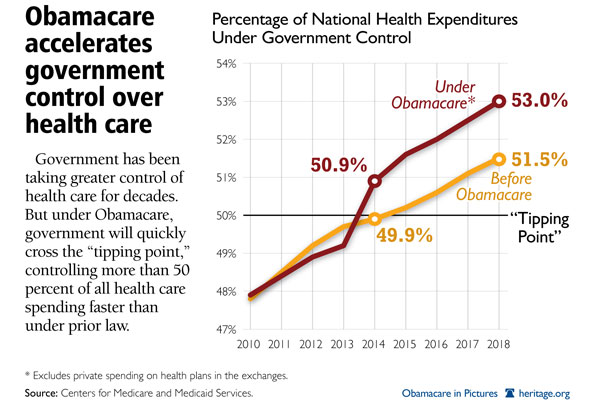While the President’s FY2013 budget ignores the looming crisis of entitlement spending, the House and Senate Budget Committees, to their credit, are keeping their eyes on the ball this week with hearings on the three largest threats to the country’s economic health: Medicare, Medicaid, and Social Security. These hearings usefully keep attention focused on the urgency of the problem and will be even more valuable if they lead to proposals for real solutions.
Naturally, such events invite a bit of political theatrics, as Members on each side critique reform proposals from the other. But that should not overshadow the very real and difficult entitlement challenges these hearings describe.
The problem truly is serious. By mid-century, Medicare, Medicaid, Obamacare, and Social Security together will swallow up more than 18 percent of gross domestic product (GDP)—eclipsing the average historical level of federal tax revenue. That means all other government activities, including such vital ones as national defense, will have to go begging for borrowed money. This of course will add to the economic drag of extended deficits and debt. Therefore, gaining control of entitlement spending is indispensable to the country’s fiscal and economic health.
Demographics are destiny. It is well known that the problem is driven in large part by a fundamental shift in the U.S. population that will take hold during the next two decades. Stephen C. Goss, chief actuary of the Social Security Administration, describes the effect as follows:
All else equal, we will have one-third fewer working-age people for every elder in the future. This shift started around 2010 and will be complete around 2030. Even with projected increases in employment of our older population, the number of workers for each Social Security and Medicare beneficiary will drop from three to two over the next 20 years.
Government bears a large part of the blame. Government has become an increasingly dominant consumer of health care, accounting for nearly half of all national medical spending by 2010—compared with slightly more than one-third in 1976—according to Richard S. Foster, chief actuary at the Centers for Medicare and Medicaid Services. Medicare and Medicaid alone account for about 35 percent of national health expenditures. When government plays such a large role in a market, the market is sure to be distorted. That raises costs for private insurance as well.
Moreover, Medicare’s benefits and payment systems aggravate the problem. James C. Capretta of the Ethics and Public Policy Center notes the combination of Medicare fee-for-service and Medigap policies provides most beneficiaries with 100 percent coverage of services, creating inefficiencies:
This kind of first-dollar coverage provides a powerful incentive for additional use of services. Whole segments of the U.S. medical industry have been built around the incentives embedded in these arrangements. Moreover, all of the various providers of services have their own Medicare fee schedule, and can bill the program separately from all others when they render services to Medicare patients.
In short, more government control is not the answer. Instead, patients need a more consumer-oriented, market-based approach.
Obamacare will make matters worse. Its insurance subsidies, exchanges, and other components will add $645 billion to government health spending between now and 2022. In addition to all its other intrusions into Americans’ lives, the program will accelerate the government takeover of the health care market.
Reform is the only salvation. Those who claim to protect these entitlements by inaction only ensure their demise. Social Security already is running a cash deficit. Medicare spending alone is projected to exceed $1 trillion by 2022, nearly twice its current spending level. Medicaid, too, will more than double in cost by 2022, to $605 billion. The only way to ensure health and retirement security for Americans in the future is by restructuring these programs.
The Budget Committee hearings this week help refocus attention on the unyielding challenge of entitlement spending. Congress should follow up by pursuing real reforms. Even if they cannot be enacted soon, such proposals can build the foundation for necessary reforms in the future.





























